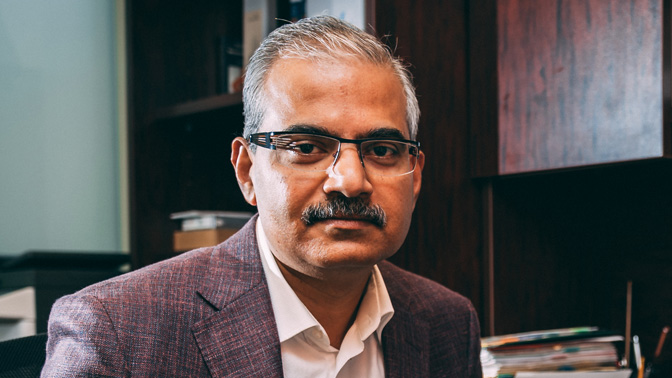
Dr. Vinod Chandran, an Affiliate Scientist at Krembil Research Institute, is the lead author on a study demonstrating the consistent efficacy of ixekizumab in treating psoriatic arthritis for up to three years.
Psoriatic arthritis is caused by abnormal activity in the immune system that causes joint damage. The disease can occur in up to 30% of people living with psoriasis. There is no cure for psoriatic arthritis. However, there are treatments available to delay the progression of the disease.
Ixekizumab is a biologically derived drug that interacts with the immune system to help fight inflammation. Developed by Eli Lilly and Company, the drug is approved by the US Food and Drug Administration and Health Canada for treating two types of arthritis, including psoriatic arthritis.
To determine whether ixekizumab is safe for long-term use, the research team followed 381 patients receiving the medication for up to three years.
“We found that the safety of the drug remained consistent with previous reports. We also observed improvements in the signs and symptoms of psoriatic arthritis in patients taking the drug,” describes Dr. Chandran. “Long-term studies like this one are important for evaluating the enduring benefits and safety risks of therapies for chronic progressive diseases, such as psoriatic arthritis.”
Within two years of disease onset, 47% of individuals with psoriatic arthritis experience structural joint damage, which is likely to result in irreversible joint deformity and disability. Treatments like ixekizumab can help slow disease progression and improve the quality of life for individuals living with psoriatic arthritis.
This work was supported by Eli Lilly and Company.
Chandran V, van der Heijde D, Fleischmann RM, Lespessailles RM, Helliwell PS, Kameda H, Burgos-Vargas R, Erickson JS, Rathmann SS, Sprabery AT, Birt JA, Shuler CL, Gallo G. Ixekizumab treatment of biologic-naïve patients with active psoriatic arthritis: 3-year results from a phase III clinical trial (SPIRIT-P1). Rheumatology (Oxford). 2020 Feb 7. doi: 10.1093/rheumatology/kez684.

Dr. Vinod Chandran, Affiliate Scientist, Krembil Research Institute.

